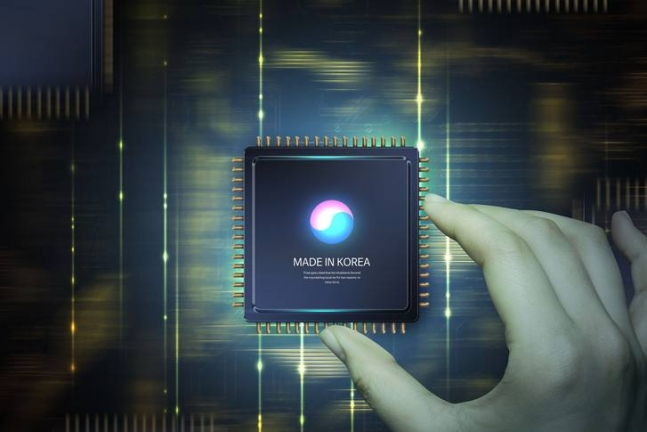Electronics
80% of Korea's data centers to use homegrown AI semiconductors by 2030
South Korean Government investment of $612 million seeks to raise chip competitiveness to the US level
By Dec 13, 2022 (Gmt+09:00)
2
Min read
Most Read
Deutsche Bank's Korea IB head quits after country head resigns


Hanwha buys SŌĆÖpore Dyna-MacŌĆÖs stake for $73.8 mn from Keppel


Macquarie Korea Asset Management confirms two nominees


Meritz leaves door open for an M&A, to stay shareholder friendly


Korea's Taeyoung to sell local hotel to speed up debt workout



South Korea by 2030 will upgrade its level of domestic artificial intelligence (AI) semiconductors to the world's best by using the nation's high-performance and low-power processing in memory (PIM) technology, which adds computational functions to high-tech memory chips.
To achieve this goal, the government will invest 800 billion won ($612 million) in PIM R&D by 2030 and promote the creation of a "K-Cloud" ecosystem to connect commercialized technologies to market demand.
Minister of Science and ICT Lee Jong-ho on Monday announced these plans under a blueprint for the advancement of Korean-made AI chips for the K-Cloud project at a strategic dialogue on second-generation AI chip development at the Gyeonggi Creative Economy and Innovation Center in Seongnam, Gyeonggi Province.
In three stages, the ministry said that by 2030, the share of domestic AI chips used on the domestic market for data centers will be raised to 80%.
The first stage is raising the domestic market share of Korean-made neural processing units (NPUs), now in the early stage of commercialization, to 23% by 2025. Domestic companies like Sapeon, FuriosaAI and Rebellions have commercialized the use of NPUs, or processors optimized for AI algorithms such as deep learning.
The second stage will combine DRAM-based PIM and domestically made NPU by 2028 to raise Korea's capacity in graphics processing units (GPU), an area that global companies such as Nvidia have a technical advantage in.
The plan is to develop by 2030 PIM technology that slashes power consumption while performing high-speed cumulative (analog MAC) operations using non-volatile memory chips to achieve the 80% market target.
Korea's level of AI chip technology is 89.2% of that of the US and 92.5% of China's, and the goal is to get up to the American grade.
The government will invest 826.2 billion won in NPU/PIM technological development by 2030 and conduct a preliminary feasibility study to promote additional projects in software development to have the nation's data centers use domestic AI semiconductors.
Another plan is to create market demand by supplying high-tech AI chips to domestic data centers.
The government said the infrastructure of the domestic cloud industry will grow in tandem with the expanded performance of data centers, and plans to accelerate AI application in sectors like public sector production, medicine, education and national defense.
A ministry source stressed the need to advance domestic technology for AI chips, saying, "Global cloud companies like Amazon have developed their own AI semiconductors, Inferentia, to provide services up to 70% cheaper than conventional GPUs and speed up image recognition eight times."
Jeffrey Hinton, a University of Toronto (Canada) professor whom President Yoon Seok-yeol met during the latter's trip to Canada, said "the upcoming AI revolution will most likely materialize through hardware innovation," the official added. "Predictions say the scale of the AI chip market in 2026 will approach half of today's memory semiconductor market."┬Ā
Write to Sang-Eun Lee at selee@hankyung.com
More to Read
-
 Artificial intelligenceSamsung, Naver agree to partner in developing next-gen AI semiconductor solutions
Artificial intelligenceSamsung, Naver agree to partner in developing next-gen AI semiconductor solutionsDec 06, 2022 (Gmt+09:00)
1 Min read -
 Korean startupsKT injects $23 mn into fabless startup Rebellions
Korean startupsKT injects $23 mn into fabless startup RebellionsJul 06, 2022 (Gmt+09:00)
1 Min read -
 SK Telecom and KT to compete in AI chipmaking┬Ā
SK Telecom and KT to compete in AI chipmaking┬ĀJan 03, 2022 (Gmt+09:00)
2 Min read -
 Artificial intelligenceTelecom giant KT to develop its own NPU, AI ecosystem
Artificial intelligenceTelecom giant KT to develop its own NPU, AI ecosystemDec 29, 2021 (Gmt+09:00)
4 Min read -
 Korean startupsKorean startup FuriosaAI's Warboy overtakes Nvidia
Korean startupsKorean startup FuriosaAI's Warboy overtakes NvidiaSep 23, 2021 (Gmt+09:00)
2 Min read
Comment 0
LOG IN


